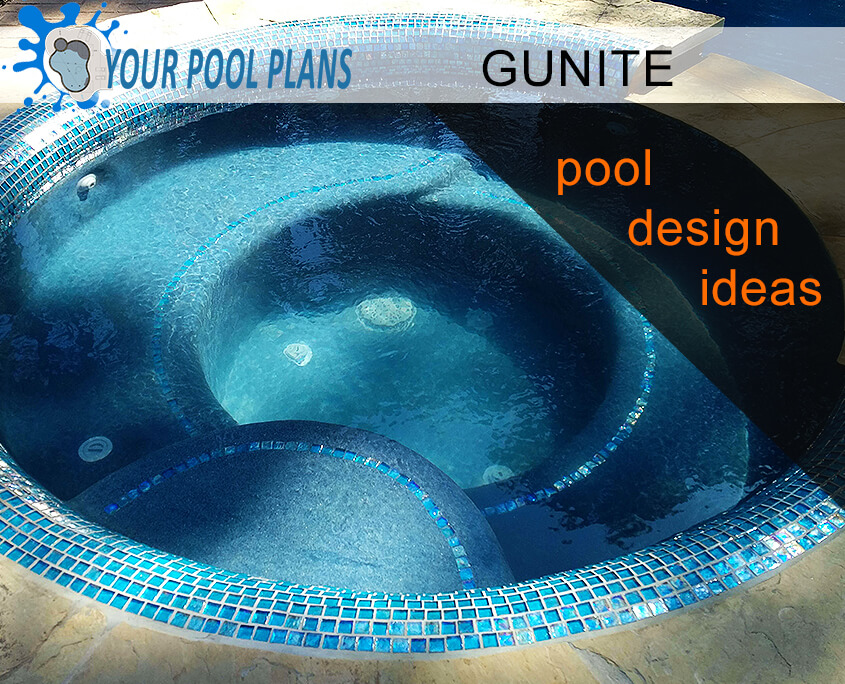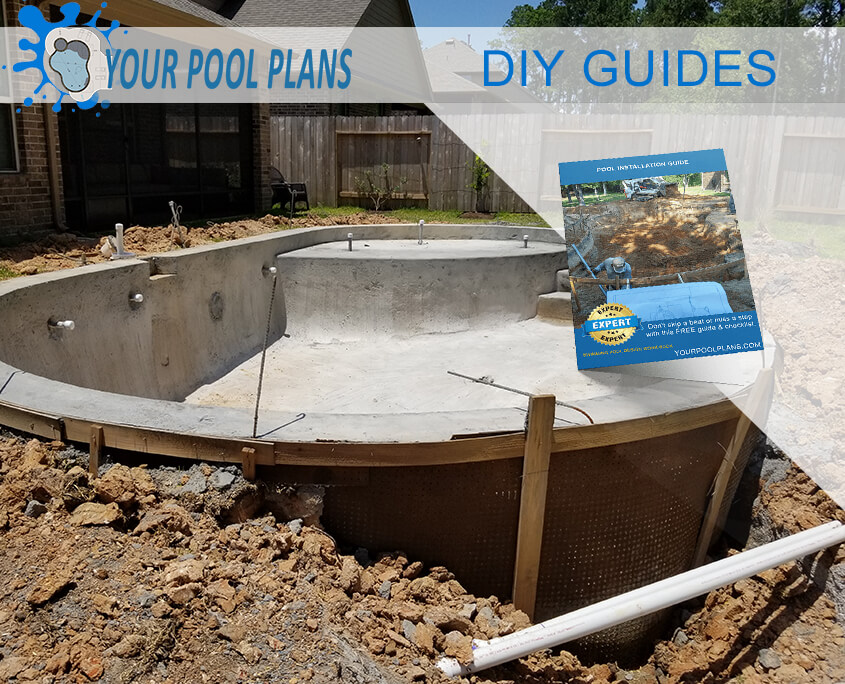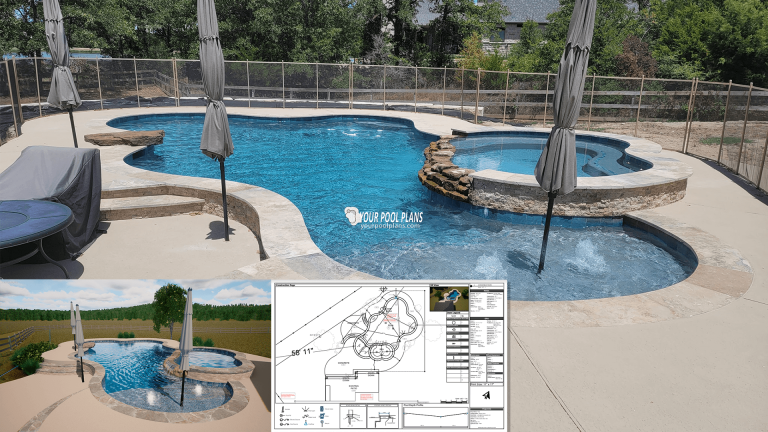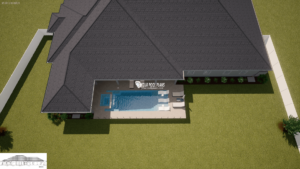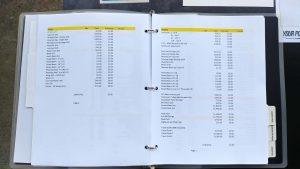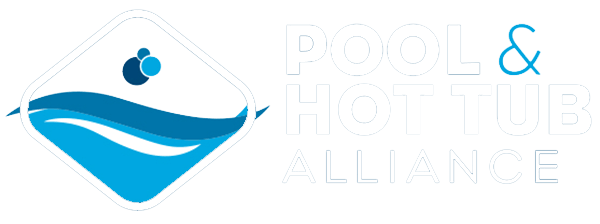What is pool gunite?
We hear a lot of people ask this question, even people who have pools may understand that gunite is ‘like concrete‘ – but not. In short, gunite is a form of cementous material used to create swimming pools, and is used in large part as the preferred method to installing an in-ground swimming pool that can last a very long time.
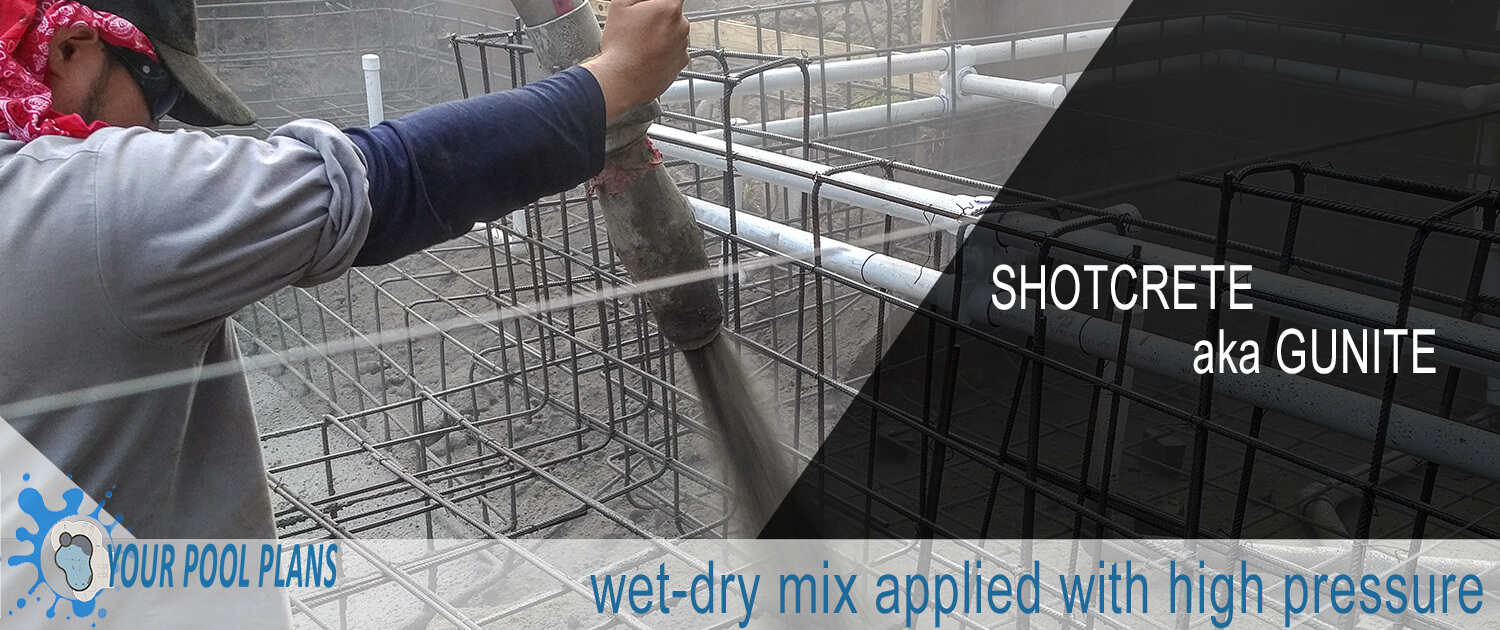
Gunite definition (see also: Shotcrete)
Shotcrete, gunite or sprayed concrete is a cementous or mortar and aggregate mixture pressurized through a hose and pneumatically projected at high velocity onto a surface, as a construction technique, first used in 1914.
Gunite was originally a trademarked name that specifically referred to the dry-mix pneumatic cement application process.
Shotcrete is an all-inclusive term for spraying concrete or mortar with either a dry or wet mix process.
History of gunite, aka Shotcrete
First ever applied for intended purposes, gunite, or shotcrete was used by it’s inventor in 1907.
Who invented gunite?
Gunite, then known as Shot-crete, was invented by a taxidermist named Carl Akeley in order to repair the crumbling facia of the Field Columbian Museum in Chicago.
What is the difference between concrete and gunite?
There are several notable differences between gunite vs poured concrete, the most obvious would be the size of aggregate (rocks & pebbles) used in the mix.
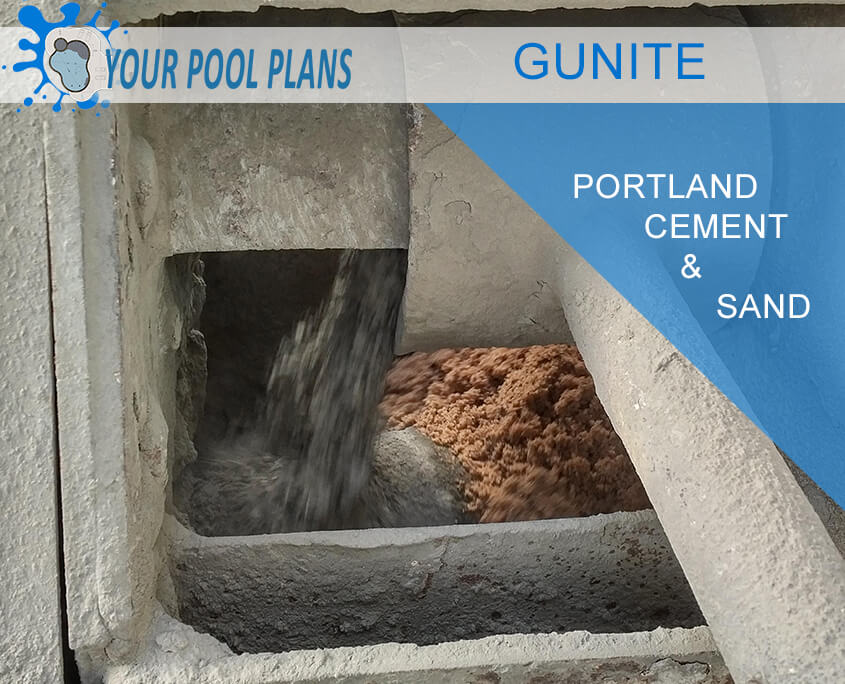
In pool construction, however, shotcrete refers to wet mix and gunite to dry mix. In this context, these terms are not interchangeable.
Gunite: a convenient form of concrete
Shotcrete is commonly used to line tunnel walls, in mines, subways, and automobile tunnels. Fire-resistant shotcrete developed in Norway is used on the Marmaray tunnel in Istanbul.
Shotcrete is very useful in hard rock mining. Development of decline pathway to go underground is critical for movement of heavy machinery, miners, and material. Shotcrete helps make these paths safe from any ground fall.
Inground swimming pools, made from gunite
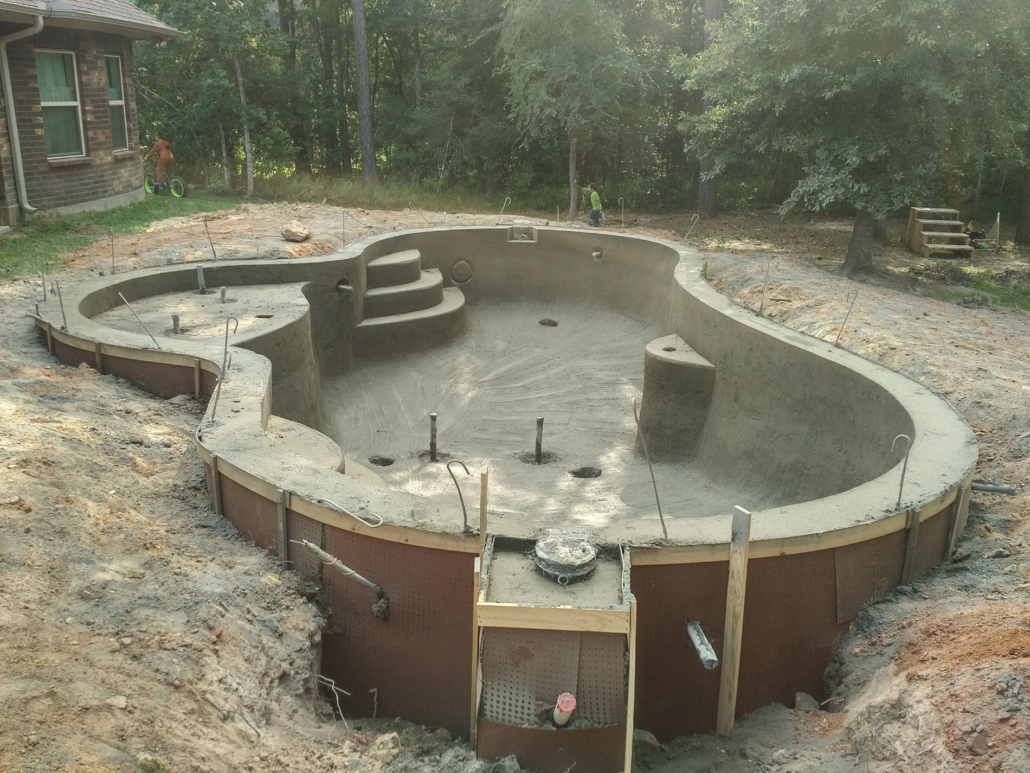
Shotcrete is also a viable means and method for placing structural concrete, such as reinforcing the footing of out-of-ground swimming pools. In-ground swimming pools can use either the wet or dry application method. Shotcrete-wet is ideal for covering large areas quickly, whereas shotcrete-dry (Gunite) is more useful for frequent start-and-stop operations.
How is gunite used to make a swimming pool?
due to the force with which it is ejected from the nozzle. It can be sprayed onto any type or shape of surface, including vertical or overhead areas.
Why is gunite a popular choice for swimming pool construction?
Gunite is an ideal construction method for a concrete swimming pool. The versatility of shotcrete / gunite placement allows for the construction of a concrete pool shell of virtually any size and shape.
The Gunite pool pros and cons
Pros: (mostly)
- Convenience of application
- Method of delivery
- Fast curing time
- Craftsmanship of shape & design
- Longest lasting pools
Gunite concrete specifications – for swimming pools
The American Shotcrete Association’s (ASA) Pool and Recreational Shotcrete Committee and ASA Board of Direction have reaffirmed a 4000 psi (27.6 MPa) minimum for in-place compressive strength pool concrete.
Complete compaction of the pool shell concrete is a direct result of the velocity (typically 65 to 115 ft/s [20 to 35 m/s]5 ) at which the mixture is shotcreted onto the substrate.
Shotcrete made from properly graded aggregates, quality cement, and potable water; properly placed by a qualified shotcrete crew; consolidated at the requisite velocity; and properly cured will easily yield a 28-day compressive strength of 4000 psi (28 MPa). In reality, 5000 psi (34 MPa) is desirable for enhanced durability and is routinely achievable by careful attention to materials and placement techniques
Minimum Gunite Specification Standards for Swimming Pools
Compressive curing strength: 3,400 – psi
Application pressure: 650 – 725 – psi
pool wall thickness: 8 inches
pool floor thickness: 10 inches
minimum rebar spacing: 10 inches x 10 inches (on center)
pool beam thickness: 12 inches x 12 inches
More technical info here:
https://www.shotcrete.org/pages/products-services/shotcrete-resources.htm
DIY gunite swimming pool construction
Shotcrete specifications—from mixture design through application—hold pool contractors responsible for shotcrete performance. Engineering plans, architectural renderings, or referenced concrete standards applied to pool construction use a variety of shotcrete terminology—both correctly and incorrectly
Terminology for Gunite and Shotcrete
Curing
Action taken to maintain moisture and temperature conditions in a freshly placed mixture to allow cementitious material hydration to occur so that the potential properties of the mixture may develop.
Dry-mix shotcrete
Shotcrete in which most of the mixing water is added at the nozzle.
Finish
The texture of a surface after consolidating and finishing operations have been performed.
Forms
A system for the in-place support of fresh shotcrete, which is rigid enough to resist the impact force of shotcrete while maintaining the intended shape and preventing excessive vibration.
Overspray
Shotcrete material deposited away from intended receiving surface.
Positive displacement
Wet-mix shotcrete delivery equipment in which a pump or other non-pneumatic means pumps the material through the delivery hose in a solid mass.
Porosity
The ratio of the volume of voids in a material to the total volume of the material.
Permeability
The rate of flow of water through a cross-sectional area of a porous medium under a given hydraulic gradient and temperature condition.
Rebound
Shotcrete material that bounces away from the surface against which the shotcrete is being projected. Rebound has inadequate cementitious content as compared to the original shotcrete.
Slump
A measure of the consistency of fresh concrete equal to the subsidence of a molded specimen immediately after removal of the slump cone.
Gunite & Shotcrete terminology for swimming pools
- Beam:
- Weep Holes:
- Elevation:
- Rebar:
- Stub-Out:
- Notch:
- Water Line:
- Skimmer:
As a DIY building your own swimming pool, the good news is that YOU DO NOT need to be the expert, you just need to know the critical guidelines and specifications and a good gunite applicator to get the job done right. We also provide you with all of the reference materials and checklists to make sure your swimming pool gunite is done according to the ASA (American Shotcrete Association).
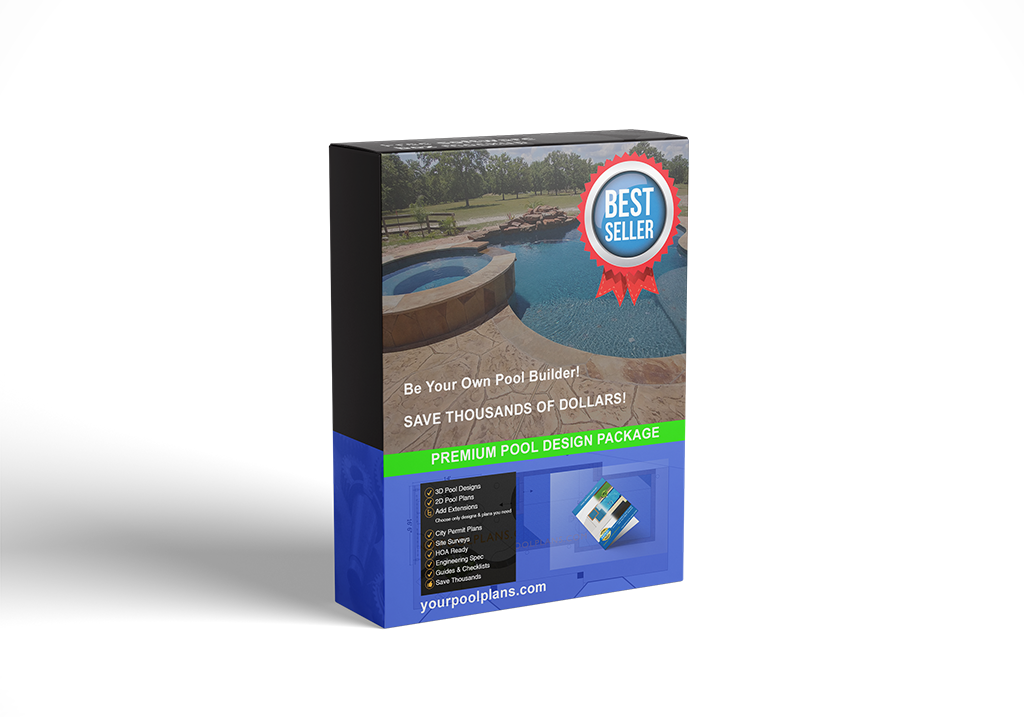
We help you every step of the way starting with custom designed pool plans ready for permits & construction!
Most Frequently Asked about Gunite / Shotcrete (FAQs)
How much does it cost to gunite a pool?
Costs vary depending on project needs. Shotcrete swimming pools are typically more durable and longer lasting than poured concrete. Poured concrete can have a compressive strength of 2,500-3,000 psi, whereas shotcrete exceeds 4,000 psi.
How do you care for a new gunite pool?
After the first day: you will need to water the heck out of that gunite – all of it. Water curing is the most important factor in getting the gunite / shotcrete to cure at it’s highest yield compressive strength (psi).
If you fail to water-cure the pool gunite you could have a swimming pool with a weak shell prone to cracking. This is something that is ALWAYS the responsibility of the pool owner, even if you hire a pool contractor.
How long does Gunite take to cure? (for pools)
It takes 28 – 50 days (depending on geographical variables) for gunite / shotcrete to fully cure. So the next pool builder that tells you they can build your custom gunite pool in a month or less is bluffing you.
From a practical sense you should not even think about plastering the interior surface until 4 weeks after the gunite was installed.
How much does it cost to maintain a gunite pool?
It cost no more or less than the same size pool with the same type of features that was built in any other method such as vinyl liner or fiberglass.
Gunite allows the pool owner to get a bit extravagant with the pool design, in some cases the amazing features you can achieve with shotcrete design may not be worth the cost of upkeep – sometimes simpler design is better.
On average in Southern United States the average monthly cost to maintain a gunite pool is:
$180/ per month if hiring pool service
$95 / per month if going DIY
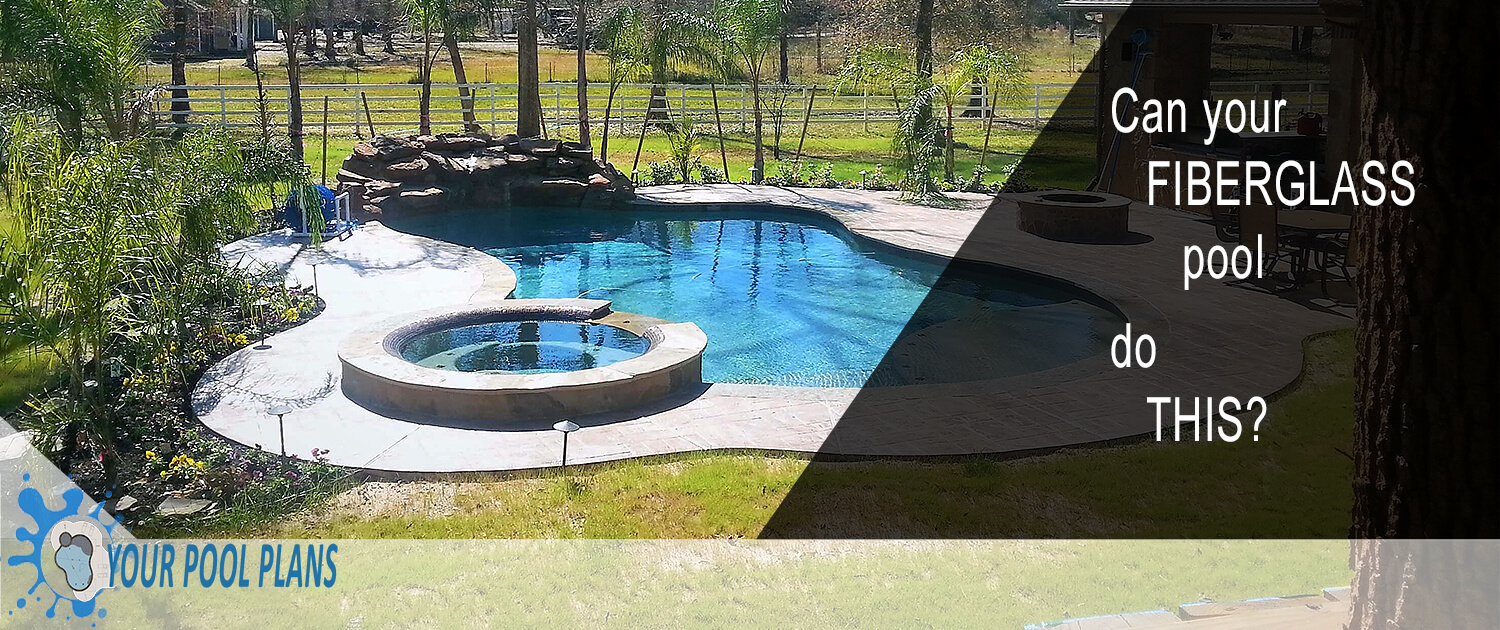
Gunite vs fiberglass pools comparison
Versatility: Compared to a shotecrete pool, fiberglass pools have limitations on location placement, and in many cases fiberglass is not the suitable pool structure for highly custom applications, and projects requiring the pool to become part of retainer walls.
Design: Compared to gunite swimming pools, fiberglass pools do not offer the scope and breadth of design possibilities that shotcrete pools can offer.
Cost: On average the cost of fiberglass is less than gunite pools by around $3,500 to $5,000, but as mentioned your design options are limited with fiberglass pools.
Gunite vs vinyl liner pools comparison
Versatility: Vinyl liner pools suffer the same strength and placement inadequacies as do fiberglass pools when compared to gunite pool installations.
Design: Vinyl liner pools come in pre-designed panels with pre defined vinyl liners covered in printed patterns that will fade over time. The average liner may only last 8 years, and can suffer much more easily to damages compared to a gunite pool structure.
Cost: More affordable than a fiberglass pool shell – you get what you pay for. Although an inground solution at a seemingly affordable price, the long term costs will have you replacing liners and dealing with equipment & water flow problems – not to mention the hard to find parts availability.
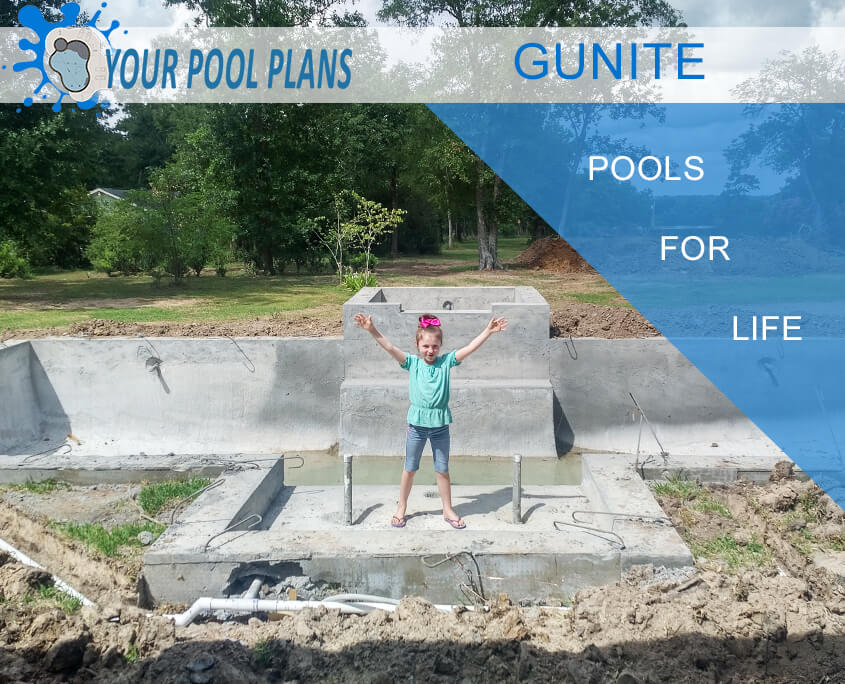
Related Content, Terms, Topics and more
Gunite pool cost
The whole project cost – how much does a complete gunite pool cost?
A new gunite swimming pool cost to build on average:
80 LNFT Perimeter
400 Surface Area
400 SQFT Decking
Equipment
Materials
DIY Pool Construction Cost:
$26,000 to $29,000
Pool Builder Pricing:
$36,000 to $38,000
Gunite cost per yard / truck load
Gunite application is billed by the amount of material used, charged by the yard to include travel time and labors for the installation.
The average price per yard for gunite swimming pools is:
$160 to $215 per yard
The average size gunite truck capacity is about 14 yards, so the average cost of gunite per truck load is:
$2,240 to $3,010
How much gunite is in one truck load?
About 14 yards
One truck of gunite / shotcrete might be enough for a standard 7 ft diameter spa
Gunite pool timeline
How long does it take to build a gunite swimming pool?
Average time to build: 8 to 12 weeks
Much of the time line to installing a gunite pool has to do with weather conditions.
It should only take a maximum of 2 months from excavation to filling with water, and it may take up to 1 final month of curing the pool interior (depednign on the type of gunite pool finish).
Gunite pool construction steps
There are roughly ’12 steps to building a gunite swimming pool’.
Gunite pool repair near me
A pool with a crack is never fun, you need to get that fixed. Luckily there are approved methods for detecting a swimming pool leak and making proper gunite repairs.
Gunite pool repairs can range in effect. As pools age the gunite shell may be well intact but the other materials such as coping, tile, plaster, or concrete may be in need of repair.
When seeking out gunite pool repairs it would be advised to contact an actual gunite company rather than a local pool repair shop.
Gunite pool resurfacing cost
Although most gunite pool interiors last over 10 years, on average, there will come a time when resurfacing the pool is a necessary investment.
Gunite pools offer the longest lasting materials for swimming pools, but nothing lasts forever. When it is time to resurface your gunite pool here are some general pricing & cost guidelines:
Standard pool plaster gunite finishes cost:
Standard pool interior finishes include marcite and marble dust based plaster material for gunite pools. The base color is always white, and additive such as color, aggregate are added at cost and depend on the pricing from the applicator.
$5 to $6 per square foot (surface area)
Pebble pool finishes for gunite cost:
Premium finishes are a level up from the standard gunite pool interiors and offer more color and aggregate variations which may require certification to install in some cases.
$8 to $14 per square foot (surface area)
Sources, References, Citations:
– Wikipedia (gunite) – https://en.wikipedia.org/wiki/Shotcrete
– ASA (American Shotcrete Association) – https://www.shotcrete.org/pages/why-shotcrete/pools-recreation.htm
– SCA (Sprayed Concrete Association) – http://sca.org.uk/case-studies/


